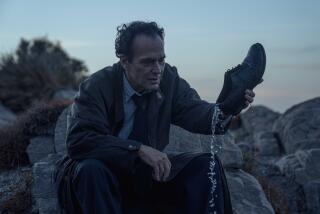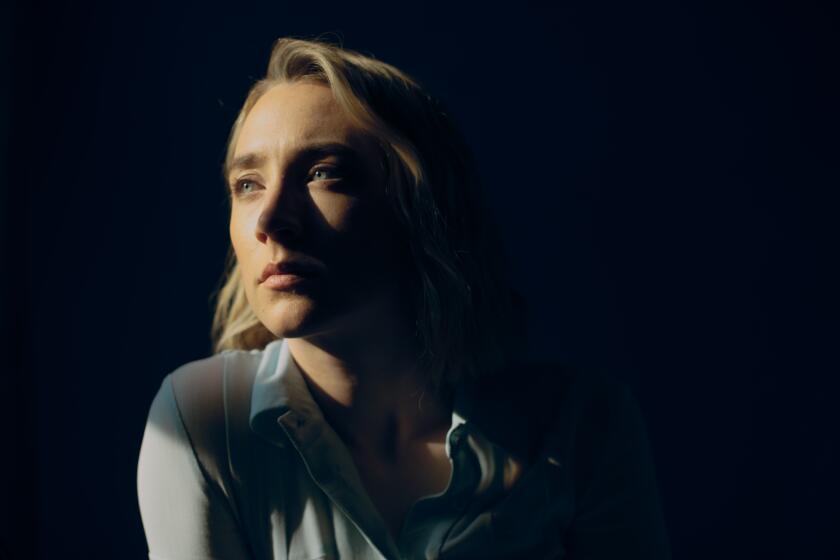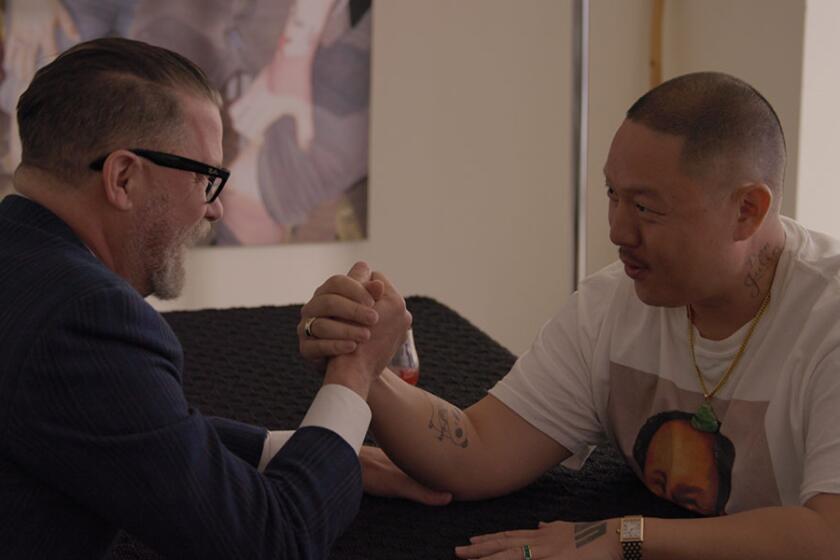Review: Natalie Portman and director Pablo Larraín team for ‘Jackie,’ a transporting, transfixing biopic

Kenneth Turan reviews the Jacqueline Kennedy biopic “Jackie,” directed by Pablo Larraín and starring Natalie Portman, who shows us aspects of the the first lady we might not have known before. Video by Jason H. Neubert.
Jackie, we hardly knew you.
Though no more than that single word is needed to bring to mind an entire universe of memories, mythology and celebrity, the woman it conjures had a core mystery that remained unassailable despite media scrutiny of the most relentless kind.
To convincingly pull the curtain back on that kind of a life, to be true to the tragic history and alive to the unexplored drama, to take smart and fearless ownership of what could have been an overly familiar story could not have been more difficult.
But what makes the success of “Jackie” even more remarkable is the paradoxical team that came together to persuasively imagine the behind-the-scenes drama that followed the Nov. 22, 1963, assassination of President John F. Kennedy.
Crafting the compelling script, which won the screenwriting prize at Venice, was a man best known as a successful television executive. Directing this story of an American legend was a Chilean filmmaker who’d never worked in English before. And the star was an actress who, despite an Oscar already under her belt, seems with this performance to be finally coming into her own.

“Jackie” follows First Lady Jacqueline Kennedy, played by Natalie Portman, after the assassination of President John F. Kennedy.
It was writer Noah Oppenheim, a longtime political junkie and senior vice president of NBC News, who had the idea of doing a multilayered examination of Jacqueline Kennedy during the post-assassination week when she had to deal with her own personal devastation as well as questions of preserving her husband’s legacy.
Although director Pablo Larraín is not yet a mainstream name, exceptional films like “No” and the forthcoming “Neruda” have made him highly regarded internationally. Larraín has an instinct for the jugular and a gift for maximum emotional impact, and his disconcerting, intentionally off-kilter “Jackie” demonstrates the ability to join an art house sensibility with a broader popular touch that echoes what Christopher Nolan has accomplished.
Larraín told his producers he wouldn’t do “Jackie” unless Natalie Portman agreed to take on the role, and her superb performance, utterly convincing without being anything like an impersonation, vindicates his determination.
Following her exceptional self-directed work in “A Tale of Love and Darkness,” Portman is going from strength to strength, and her Jacqueline Kennedy, half resolute warrior, half frightened wreck, is a completely believable study in agony, sophistication and steely perseverance.
With typical brio, Larraín opens “Jackie” with an assertive closeup of the woman in question looking beyond distraught and walking toward the camera with the intentionally dissonant sounds of Mica Levy’s unsettling score echoing behind her.
Then it’s one week later at the Kennedy compound in Hyannis Port, Mass., with Jackie watching suspiciously as a taxi pulls up and disgorges a journalist (Billy Crudup), unnamed but based in part on Life magazine’s Theodore White.
The reporter is there to interview Mrs. Kennedy, but this is not a meeting of equals. Jackie, livid about the press, is determined to get her own version of history into the mix, and she lets the journalist know in no uncertain terms that she will have the final say as to which of her words the public gets to see.
“There’s a great divide,” she tells him in one of the script’s many fine lines, “between what people believe and what I know to be true.”
With this interview as its baseline, “Jackie” moves purposefully back and forth in time through multiple incidents and scenarios. It includes the grim assassination as well as Jackie’s determination to be no one’s puppet and plan a funeral that would secure her husband’s place in history in much the same way, she is well aware, as Abraham Lincoln’s did.
A key segment, and one apparently added at Larraín’s suggestion, is an in-depth look at the 1962 television program “A Tour of the White House with Mrs. John F. Kennedy,” in which Jackie takes CBS newsman Charles Collingwood, and the viewers of the world, through the newly renovated White House to emphasize that the improvements were paid for privately and done to enhance the structure’s central position in American history.
Though it sounds simple, this segment, highlighting Jackie’s media savvy and personal nervousness, showcases Larraín’s gift for virtuoso technique. He has both utilized sections of the original black and white television kinescope and placed Portman as Jackie inside it as well as taken us behind the scenes via color footage that exactly reproduces the look of the original.
In addition to using top French cinematographer Stephane Fontaine (“A Prophet,” “Captain Fantastic”) and his regular editor Sebastian Sepulveda, Larraín utilized superior talent like production designer Jean Rabasse and costume designer Madeline Fontaine to insure that the historical events depicted, like Jackie’s iconic outfits and Lyndon Johnson’s swearing in on Air Force One, are shown just as they should be.
Larraín has also been extremely savvy in his casting of “Jackie’s” numerous supporting roles, often using fine actors in unexpected ways. In addition to Crudup as the reporter, there is Peter Sarsgaard as Robert Kennedy, John Hurt as an imperturbable priest, Richard E. Grant as Kennedy confidant William Walton and, most impressive, Greta Gerwig — unrecognizable as Jackie’s friend and social secretary Nancy Tuckerman.
Finally, however, it is the powerful collaboration of star Portman and director Larraín, their determination to make this story their own, that has made all the difference. At the film’s world premiere at the Venice Film Festival, I ended up seated directly behind them and, when they took their bows and hugged for photographers, I noticed how extraordinarily tight their embrace was, a mutually intense grasp that seemed to say, “It was not easy, but we did it, we really did it.” And so they have.
===
MPAA rating: R, for brief strong language and some violence.
Running time: 1 hour, 31 minutes.
Playing Arclight, Hollywood; Landmark West Los Angeles.
More to Read
Only good movies
Get the Indie Focus newsletter, Mark Olsen's weekly guide to the world of cinema.
You may occasionally receive promotional content from the Los Angeles Times.











